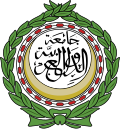List of secretaries-general
| No. | Image | Secretary-General Birth–Death | Took office | Left office | Nationality |
|---|---|---|---|---|---|
| 1 | Abdul Rahman Azzam (1893–1976) | 22 March 1945 | September 1952 | ||
| 2 | Abdul Khalek Hassouna (1898–1992) | September 1952 | 1 June 1972 | ||
| 3 |  | Mahmoud Riad (1917–1992) | 1 June 1972 | March 1979 | |
| 4 |  | Chedli Klibi (1925–2020) | March 1979 | September 1990 | |
| 5 |  | Ahmed Asmat Abdel-Meguid (1923–2013) | 15 May 1991 | 15 May 2001 | |
| 6 |  | Amr Moussa (1936–present) | 15 May 2001 | 1 July 2011 | |
| 7 |  | Nabil Elaraby (1935–2024) | 1 July 2011 | 3 July 2016 | |
| 8 |  | Ahmed Aboul Gheit (1942–present) | 3 July 2016 | Incumbent |
